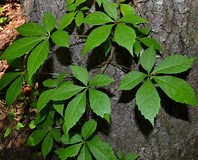So let me preface this, Alan, by saying that I defer, in general, to your much greater expertise. I’m just describing my own local observations and deductions. I’ll try to give a little more detail below so that people can evaluate my thinking for themselves.
So, to be a little clearer, my guy doesn’t particularly advertise his fruit as being no-spray. Like, there’s no sign saying, “No Spray Peaches” on his stand, just a sign saying peaches however much a box. (Along with apples, raspberries, etc.) I happened to read a piece about his family’s orchard online and it mentioned in passing that they were growing their fruit no-spray. Assuming that the information came from him, I’m inclined to believe it. (I think I may have asked him about it once, but I can’t exactly recall.)
Why am I inclined to believe it? Partly it’s that I consider him to be a stand-up guy, based on our interactions over a number of years, so I don’t think he would intentionally deceive someone who asked about his growing practices. (And for what it’s worth, his family has been running their orchard since the 80s.)
Partly it’s because he doesn’t particularly advertise the fruit as being no-spray, nor, from what I can tell, does he charge higher prices than local peaches generally go for. Lower than some places, in fact. So, while I understand where your skepticism is coming from, this isn’t a case of implied-purity-at-a-premium-price. (While this is partly speculation on my part, I’m guessing that he MIGHT be growing no-spray partly to minimize overhead, because it seems like a minimum-overhead operation all around. Setting other considerations aside, he might have concluded that he’s better off growing the peaches he can grow without spraying than he would be spending the money it would take to spray what would remain a marginal crop climate-wise.)
Partly, it’s because the quality of the fruit seems consistent with what I understand to be the challenges of no-spray orcharding in New England. Like, it’s visibly less pretty than fruit from local orchards that practice IPM, which from what I can tell, is what most of the still-pretty-small-but-comparatively-larger places around here do. And sometimes, when the weather doesn’t cooperate, there may be no marketable fruit at all. Still tastes good when it’s there, though.
And partly it’s because the possibility of growing stone fruit without spray on a SMALL scale seems consistent with other local evidence. For example, our next door neighbors had a couple of peach trees for many years. As far as I can tell, they did virtually nothing with the trees: didn’t spray, didn’t thin, largely didn’t prune, and the trees (of a variety they didn’t know) were placed in a less-than-optimal spot for sun and ventilation. Nevertheless, on years when they didn’t get frozen out, the trees bore a pretty sizable crop of fruit, much of which dropped into our yard. As far as I could tell from picking it up off the ground, the fruit was largely sound (not rotted), except for the chunks that the squirrels had taken out of it.
I know several other people around the neighborhood who have peach trees that they do just marginally more to take care of (still not spraying), and when the weather cooperates, they get a good amount of fruit that they appear to enjoy. Is the fruit as good as the fruit that you or Olpea grow, or as good as your customers (of different kinds) might demand? Very doubtful. That being said, it’s not super uncommon for people where I live to grow not only no-spray but to all appearances minimally cared-for stone fruit that they consider worth growing (granted, of course, that it’s not super common for people to grow fruit at all).
Considering that my Fruit Guy is considerably more skilled and knowledgeable than my neighbors (and let’s be honest, me), I find it plausible that he could be growing the fruit that he grows, on the scale that he grows it, on a no-spray basis.
All that being said, New England is definitely not California, and from everything I understand, peaches and other stone fruit are not a super reliable crop here. I would imagine that an effective spray program could mitigate some (not all) of the hazards involved. However, my personal observations suggest that in this part of New England, spraying is not absolutely necessary to grow fruit that some people would consider worth growing, eating, and in some cases paying for. (Understanding, again, that we are talking about growing on a small scale and for what we might call a sympathetic audience.)



